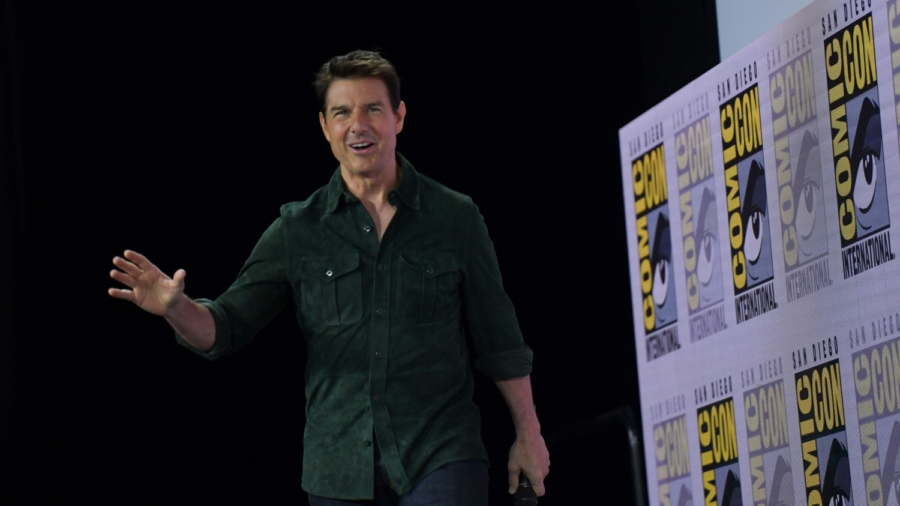Donald Trump Jr. has taken to Twitter to highlight a concerning detail in the newly-released trailer for the Top Gun sequel “Top Gun: Maverick” that is set to hit the big screen in 2020.
Trump Jr. retweeted a post by Mark MacKinnon, a reporter from the Canadian-based newspaper The Globe and Mail, which pointed to a vague alteration to the protagonist’s jacket.
“Maverick is wearing the same leather jacket—only this time it’s Communist Party of China-approved, so the Japanese and Taiwanese flag patches are gone,” MacKinnon wrote.
There’s a new Top Gun movie coming out. And Maverick is wearing the same leather jacket – only this time it’s Communist Party of China-approved, so the Japanese and Taiwanese flag patches are gone (screenshot on right is from the new trailer)… pic.twitter.com/gUxFNFNUKX
— Mark MacKinnon (@markmackinnon) July 19, 2019
Trump Jr. added in his tweet: “China makes them do this for access to the Chinese market.
“If Hollywood doesn’t comply they don’t get to sell to their 1.5 billion people,” said the president’s son. “Imagine who else they’re doing this to and the subversive power they wield. Remember this when you think anything they do is ‘fair.'”
China makes them do this for access to the Chinese market. If Hollywood doesn’t comply they don’t get to sell to their 1.5 billion people. Imagine who else they’re doing this to and the subversive power they wield. Remember this when you think anything they do is “fair.” https://t.co/mULB5xclPZ
— Donald Trump Jr. (@DonaldJTrumpJr) July 20, 2019
The new flags—which no longer represent that of any legitimate nation—are indistinguishable, although the color palette went unchanged from the original box-office hit from 33 years ago.
Neither directors nor actors of the film have publicly explained why the changes were made.
Film Industry’s Second-Largest Market
China owns the second-largest film industry in the world.
Using this market, the Chinese Communist Party (CCP) has both infiltrated and influenced the American film industry.
In an article titled “Tencent Pictures’ Lineup Is a Mix of Hollywood Content and Chinese Propaganda,” Variety confirmed that Tencent Pictures, a Chinese-based production company, invested in “Top Gun: Maverick.”
“The lineup kicks off with involvement in ‘Me and My Motherland,'” reads the article, “a film tribute to the 70th anniversary of the founding of the People’s Republic of China, jointly directed by seven of the country’s top directors.”
While it is unknown if the Japanese and Taiwanese flags were removed so the movie could feature in Chinese theatres, it is certain that China’s relationship with these two nations is complicated—and in Taiwan’s case, hostile.

Editing Films to Satisfy the CCP
Alterations to Hollywood productions are not unheard of, such as in “World War Z,” starring Brad Pitt. The script by Max Brooks originally set China as the origin of a zombie virus, but it was renamed “Moscow flu” in the Chinese version to satisfy the country’s censors, according to The Australian.
Curiously enough, in the novel, Brooks explains that the virus was spread through the black market organ trade in China, which one character described as the “largest exporter of human organs on the world market.”
An independent tribunal in London confirmed on June 17 that the CCP has been forcibly harvesting organs from prisoners of conscience for years. The panel said that practitioners of Falun Dafa—a meditation practice that teaches truthfulness, compassion, and forbearance—were “probably the principal source.”

The movie did not mention the black market organ trade.
Vice President Pence explained the CCP’s relationship in the American film industry at the Hudson Institute in Washington last year.
“Beijing routinely demands that Hollywood portray China in a strictly positive light, and it punishes studios and producers that don’t,” Pence said.
Reuters, and Epoch Times reporters Cathy He and Annie Wu contributed to this article.

